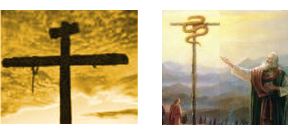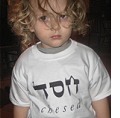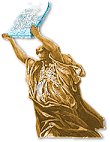|
|
|||||||||||||||||||||
 |
|||||||||||||||||||||
|
Learn Hebrew |
|||||||||||||||||||||
 |
|||||||||||||||||||||
|
Learn Torah |
|||||||||||||||||||||
|
July 2007 Updates Parashat Eikev This important parashah includes the second (of three) portions of the Shema (called the Vehayah). These words, reiterating the connection between Israel's devotion to the LORD and their blessing as God's chosen people, are recited twice a day by Orthodox Jews all over the world.
Tu B'Av - The 15th of Av 07.30.07 Happy Tu B'Av to everyone! Since Biblical times the 15th of Av has been celebrated as a holiday of love and affection, and in modern Israel it is celebrated as a sort of "Valentine's Day" (though it is a much older and sober holiday that St. Valentine's Day).  Since it falls on the 15th of the month, Tu B'Av is a night of the full moon. The 9th of Av (Tishah B'Av) recalled the history of Jewish tragedy, but the full moon of Av represents the transformation of tragedy into joy. Indeed, as the "last" festival of the Jewish year, Tu B'Av prophetically pictures our marriage to the Lamb of God (Seh Elohim), the LORD Yeshua our beloved Mashiach!
New Hebrew Meditation 07.30.07 I wrote a new Hebrew meditation (called the Comfort of Hope) based on Isaiah 40:31a, "they that wait upon the LORD shall renew their strength." This favorite verse includes great promises for koach (strength) to those who put their trust in the LORD God of Israel. I hope you will find it strengthening to your faith, chaverim...  Note: I am still without a computer at home and am waiting for the new box to come in from Dell. Your prayers are most appreciated! Thank you to many of you who wrote to wish me well....
System Crash... 07.27.07 Last night my home PC delivered the dreaded "blue screen of death" message - meaning that it was inoperable. 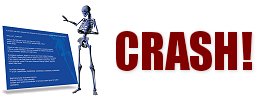 After trying a bunch of things (I won't bore you with the details), I was forced to reinstall the operating system. Tragically, the new installation DELETED a lot of my saved data, including all my pictures of our family over the last 2 years... In order to recover them now, I'd have to use a data recovery service that would cost me well over $1000!
Tetelestai! - It is Finished! 07.26.07 Just before Yeshua died, he said something of breathtaking importance. An eyewitness to his crucifixion wrote, "When he had received the drink, Jesus said, 'It is finished.' With that, he bowed his head and gave up his spirit" (John 19:30; Matt. 27:50). In Koine Greek, this final statement is a single word consisting of ten letters: tetelestai! 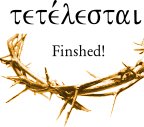 Tetelestai means "It is finished, it stands finished, and it always will be finished!" It comes from the word telos, meaning a goal or purpose (teleology is the study of the purpose of something). Telos is the word Paul used when he wrote: "For Messiah is the end of the law (telos nomou) for righteousness to everyone who believes" (Rom 10:4).
This portion of Torah includes some of the most fundament texts of the Jewish Scriptures, including the Ten Commandments, the Shema (the duty to love God and study His Torah), and the commandments of tefillin and mezuzot. In addition, Moses' prediction of the galut (exile) of national Israel and the eventual redemption of the Jewish people in acharit hayamim (the end of days) is provided in this portion.
For little children and other misfits... 07.22.07 I received an email today that chided me for including some writing of Soren Kierkegaard on this site, referring to it as "Greco-Roman" teaching. My response was to remind this person that when the Ruach HaKodesh (Holy Spirit) was first given to kallat Mashiach (the church), one of the first signs was the gift of "tongues," or the supernatural ability to fluently speak the message of Yeshua in the language of others. But why not the other way around? Certainly God could have caused those within earshot to have supernaturally received or translated the message without altering the original source message - but that's not what happened. God enabled those who delivered the message to be His voice to those of other cultures and nationalities. After the parochet (veil) of the Temple was rent asunder, the LORD God of Israel "reached out" to a lost world composed of various nationalities and languages. The message of Yeshua never was (and never shall be) subject to the "gatekeepers" of parochial religion or tribal interests. No indeed, the Life of the Mashiach was given for the ransom of the entire world. No wonder, then, that God chose Koine Greek as the linguistic medium for the message of salvation rather than classical Hebrew. This was the lingua franca of the day, the best choice to get the message out to as many people as quickly as possible. In short, the message of Yeshua was not intended to create a snob religion of Gnostics or religionists who attempt to use jargon and other devices to withhold the truth from others. Yeshua only had hard words for those who sought to keep "the little children" from embracing Him. God "takes" the wise in their own craftiness and considers the wisdom of this world to be utter foolishness. He reveals Himself to the lowly and reaches out to those who are aware of their need for Him. 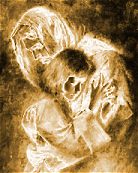 All this is not to say that we do not benefit from studying Hebrew, of course, or from learning the Hebraic mindset of the Scriptures. There is indeed great value in this enterprise, if it is done in humility and with an awareness that the greater goal is to bring the message of Yeshua to others....
The Road is How 07.19.07 All of us - without exception - hold fundamental presuppositions that mark our ultimate concerns. We believe in order to understand, and not the other way around. Reason itself is a matter of faith that is ultimately validated by an aesthetic sense of "fitness" or coherence. In other words, if you push the idea of reason to its limits, you will find that it is based on a sense of "fit" or proportion that the mind accepts as self-evidently true. This is part of what William James called the "sentiment of rationality" ("irrationality," on the other hand, is a state of cognitive dissonance or a sense that the relation does not fit or hold together.) Today I added a short excerpt from the writings of Soren Kierkegaard (1813-1855) who explained that it is not the "what" of life that matters as much as its "how." How we choose to encounter reality will ultimately determine the what of that reality. Choosing to believe in the good will enable us to apprehend it and ultimately transform us into that which is good. Or as Yeshua Himself put it, "According to your faith, be it done unto you..."  You might wonder why I add this sort of thing to a site devoted to studying Hebrew and the Jewish roots of the Christian faith. First of all, please let me remind some of my Messianic friends that this site is called Hebrew for Christians, and therefore I do not entertain a priori prejudice against Christian doctrine or concepts as they have been expressed in the historical Church over the last 2,000 years or so (though I appeal to God's shepherds to understand the Church's relationship to she'arit yisrael more fully, etc). Moreover, Kierkegaard, a defector from the Lutheran Church tradition, is simply encouraging us to examine our lives to ensure that we are living the truth. Studying is not an end in itself, after all, but a means to the greater end of honestly choosing in light of the reality and presence of the LORD.
Living the truth is essentially relational, and our spiritual condition is inevitably revealed by our decisions - not by what we might merely profess to believe. As SK says, Christ does not call "professors" of Christianity but rather followers - and He bids them come and die. Parashat Devarim 07.18.07 Despite the numerous computer problems I've been experiencing over here, I managed to get the weekly Torah summary completed (Devarim) and created a new PDF file for you to download. I hope you will find it helpful.  Note that this Shabbat precedes the Fast of Av (Tishah B'Av) and is called "Shabbat Chazon," the "Sabbath of vision," since the Haftarah that is read comes from the first chapter of Isaiah regarding the coming destruction of the Temple. On Tishah B'Av, Jews around the world fast in remembrance of many tragedies that have befallen the Jewish people, such as the destruction of both the first and second Temples. Many Jews also remember the atrocities of the Shoah (Holocaust) during this time. Torah study is prohibited since it associated with joy... With the coming tribulation for all the world, and especially for the Jewish people, let us more earnestly pray for their salvation and blessing. Chaverim, more than ever it is imperative that we "pray for the peace of Jerusalem" (Psalm 122:6).
More Computer Problems here... 07.16.07 I am in need of prayer... the recent attacks on the computer and web services have wearied me. Thank you. 07.15.07 I am having some serious computer problems over here, and my email application is unable to send outgoing mail. I have a work-around, but it is very time consuming and problematic... I might need to buy a new computer (at least the box) in order to rid myself of these headaches and have a clean system. I am also working on the Torah portion for this coming Shabbat, though it most likely will be late this week on account of the computer issues I am dealing with presently...
Torah of Humility 07.11.07 I was reminded of something in this week's parashah (Mattot) that was quite sobering. Maybe you will find this helpful. Today my wife and I had a disagreement and we both got upset... We both hardened our hearts and we both believed we were in the right. The matter soon escalated into angry feelings. I then recalled how Joseph's son Manesseh (disguised as Joseph's servant) lost part of his inheritance for causing his uncles to rend their garments (Gen. 44:1-13). I also remembered that those descendants of Manesseh that settled east of Jordan were among the first of Israel carried into captivity by the Assyrians (c. 740 BC). What is my point? Our words and actions, if they bring anguish to the hearts of others, can cause us to lose a portion of the blessing intended for our lives. But couldn't Manasseh have argued that he was merely "obeying orders," or even that he was "right" to say what he did to his uncles? After all, hadn't they betrayed his father? Wouldn't this teach them a lesson? No. The end never justifies the means. God is not a pragmatist... Dietrich Bonhoeffer (1906–1945) tells the story about how a teacher once humiliated one of her students by standing him up before the class to ask whether his father, known as the town drunk, had been out drinking the night before. The little boy knew the accusation was true but bravely announced "No." When the teacher mockingly asked him again, the boy was adamant. "NO!" Bonhoeffer's comment was that this little boy spoke more truth by his lie than if he had merely reported the "facts" to the class -- and thereby betrayed the dignity of his father... The truth is not some objective state of affairs that can be reported dispassionately. Without love as its context, such "truth" becomes a lie. Satan keeps his own books. What might appear small in our eyes may have enormous repercussions in the realm of the spirit. Nothing is small or insignificant in this life. Our words matter. May God help us to put away our pride and all those thoughts and deeds that bring might bring pain to others... May He help us to walk in humility and love.
This week's Torah Portion 07.10.07 I stayed up most of the night to get the Torah portion completed for this coming Shabbat. As mentioned yesterday, this week we have a double portion of Torah (parashiyot Mattot and Masei). I have also created two new PDF files for you to download as well...  If you have been regularly reading and studying Torah with me, after reading these two portions we have completed sefer BeMidbar (the book of Numbers). Let me wish you Yasher Koach and Chazak! (said upon completing a book of the Torah). Next week we will begin studying Sefer Devarim (the book of Deuteronomy).
Kierkegaard's Challenge 07.10.07 I added a couple new articles to the site that are excerpts from the prodigous Danish philosopher and theologian of the 19th century, Soren Kierkegaard. These very short excerpts are meant to be provocative -- and to test some of the fundamental assumptions we all make in our everyday lives. 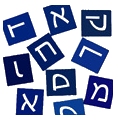
More on Liberty and the Jewish Roots 07.10.07 Based on some comments I posted here recently regarding the liberty we have in Yeshua, a dear Messianic brother wrote me and asked whether I meant to say that a Gentile or Messianic Jew should actually be forbidden to don tzitzit or other accouterments of the Jewish people. Does our liberty in Yeshua, then, mean that we are supposed to be going the other direction with all this? 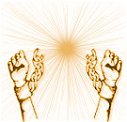 My brief answer to him was simply to point out that each of us is in our own process, and we need to give grace and love to one another. My comments about our liberty were not intended to suggest that we are restricted from enjoying Jewish customs, mo'edim, and so on, especially if they are a means to helping us sanctify the LORD in our hearts and thereby more fully express our love to Him. On the other hand, it is crucial to understand that these accouterments are merely visual aids, or a "making visible the invisible," of what is ultimately true and abiding in our hearts... They are not "shibboleths" or recipes to gain access to the LORD, since Yeshua alone is our High Priest and Intercessor and it is by means of His zechut (merit) that can draw near to the Father.
Hackers, Viruses, and Torah... 07.09.07 Because of the hacker problems I have dealt with over the weekend, the Torah portion for this coming Shabbat will be late. In fact, this coming Shabbat will be a "double portion" of Torah (there are 2 double portions during leap years and 6 during non leap years -- for more information, click here). Thank you for your patience! 
07.08.07 Baruch Hashem -- I was able to "disinfect" the computer here and clear it of viruses... however, I cannot send any email from my email program (sigh). It seems that Comcast has blocked my ability to do this on account of the virus/malware. However, I can still FTP, and with God's help I will be able to update next week's Torah portion on schedule. My sincere thanks to all of you who have prayed and offered me encouragement during this ordeal. Now if I could only get my email to work!!! 07.06.07 My home computer is infected with several viruses and "trojan horse" malware programs -- and now I have no access to the Internet. I am unsure how the system got infected, though this site has been attacked by hackers several times in the past... I am working on the issue, of course, but this might mean that I won't be able to update the site for awhile. Your prayers are appreciated, chaverim.
Consider Jesus... 07.05.07 Quite regularly I answer emails from well-meaning souls who have become so enamored with the Jewish roots of the Christian faith that they run the risk of abandoning the liberty that Yeshua came to give us... This is tragic and greatly saddens me. Just today I received an email from someone who is studying at a "Messianic Yeshiva" that apparently teaches a form of syncretism of Rabbinic Judaism with Christianity. Look, chaverim, let me say this emphatically: Rabbinical theology is different than Biblical theology, and Messianic Judaism is not some "fourth stream" of the Jewish faith with Jesus added on for good measure... With the destruction of the Second Temple (in 70 AD) and the loss of the priesthood/ means of sacrifice, there were only a few options available to the Jewish community. One was to accept the death of Yeshua as the atonement for sin, and the other was to reconstruct Jewish theology so that the community could exist without a Temple (and to therefore find a way to forgive sin without blood sacrifice). Choices were made and polarizations occurred. The Council at Yavne represented the mainstream Jewish choice. Yeshua surpasses Moses as the Creator surpasses His creation. The Scriptures command us to "consider Yeshua, [who] has been counted worthy of more glory than Moses -- as much more glory as the builder of a house has more honor than the house itself" (Heb. 3:1-6). Yeshua alone is our great Kohen Gadol (High Priest) of the better covenant than Moses' (Heb. 8:6), and Yeshua alone is the Supreme Mediator between God and man. Only Yeshua brings God and man together. Consider, then, how the New Testament states that Yeshua was greater than:
Indeed, Yeshua is called the very Creator (Col. 1:18-19) who sits upon the throne of God Himself (Psalm 45:6-7; Heb. 1:8). Simply put, Moses stands in relation to Yeshua as the creature stands before the Creator and is accountable to Him. Yeshua at Moriah is the Central Point of all history. It is the Altar. All the outpouring of the wrath of God against sin was accomplished here, since it involved the torture and death of the only true Tzaddik who ever lived. Yet it was by means of Yeshua's righteous suffering that all the families of the earth may now be blessed and escape the kelalah of HaShem. It is finished -- by the hand of Yeshua -- not Moses. We are called to follow Him....
Happy Independence Day! 07.04.07 Happy Fourth of July, chaverim! Please take a moment to pray for this country and its leaders... for the gift of teshuvah. 
Shadows and Fog... 07.03.07 Today someone asked whether he should wear tzitzit (fringes on a Tallit or other "four-cornered garment") in honor of the Torah's commandment (Num 15:38-9). Apparently he believed that tzitzit were only intended for the Jewish people, and therefore he was wondering if he was permitted to wear them. The answer to this question, of course, depends on whom you trust as an authority on the subject. If this person asked an Orthodox Rabbi, he would doubtlessly be told that it was unlawful for him to wear tzitzit, since these are indeed reserved for the Jewish people. On the other hand, if he asked someone who believes we are under a new covenant relationship with the LORD, a different answer would be given. This man's problem (once again) concerns the exact relationship between the follower of Yeshua and the demands of the Torah given at Sinai (and in particular, the covenant made with Israel at Sinai). Tell me, chaverim, did Yeshua come here to make us followers of Moses or followers of Him? 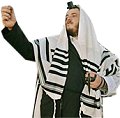 Lest we forget: The Brit Chadashah (New Testament), while acknowledging the divine origin of the Torah, appeals to Yeshua as its goal or end - the One to whom the Torah and the Prophets speak as the fulfillment of all that the LORD requires. Yeshua was far greater than a "latter day" Moses. He is the Word who was in the beginning (John 1:1) and through whom the world was created (Col. 1:16). Since Yeshua is Himself Adonai, the commandments of the Torah are indeed Yeshua's commandments as mediated by Moses, but the administration of the Sinaitic covenant, with the Levitical priesthood and its ordinances, is called a shadow (skia) of things to come (Hebrews 7:19, 8:5-7; 9:19-24, 10:1, 14). Chaverim, we are under LIBERTY in Messiah Yeshua, though we are warned not to get tangled up in a yoke of bondage again (Gal. 5:1-4). Ceremonial Torah that pertains to brit yashanah (the Older Covenant) must be recognized for what it is - a means to something better. Once we have encountered the better way to come before God, such paraphernalia will at best seem to be a token of the inner miracle of our lives. We don't fight for victory; we fight from it! Therefore, if anyone is in Messiah, he is a new creation. The old has passed away; behold, the new has come. All this is from God, who through Messiah reconciled us to himself and gave us the ministry of reconciliation; that is, in Messiah God was reconciling the world to himself, not counting their trespasses against them, and entrusting to us the message of reconciliation. Therefore, we are ambassadors for Messiah, God making his appeal through us. We implore you on behalf of messiah, be reconciled to God. For our sake he made him to be sin who knew no sin, so that in him we might become the righteousness of God. (2 Cor. 5:17-21) The LORD Yeshua is alive and is our great High Priest, the mediator of the New Covenant with the LORD. Have you encountered Him?
07.02.07 I updated the weekly parashah for this coming week (Pinchas) and created a PDF file for you to download.  When Aaron received the promise of the priesthood from the LORD, it meant that his children and their descendants would be part of the Kohanim (priestly class of Israel). However, since his grandson Pinchas (Phinehas) had already been born, he did not automatically receive this honor, especially since his father Eleazar (the son of Aaron) was married to a Gentile bride (Ex. 6:25). For a brief Hebrew mediation on this subject, see this. 07.01.07 I am writing the torah summary for this coming Shabbat. I hope to get it online some time tonight. 
|
||||||||||||||||||||||||||||||||||
|
Hebrew for Christians |
||||||||||||||||||||||||||||||||||
|
||||||||||||||||||||||||||||||||||





